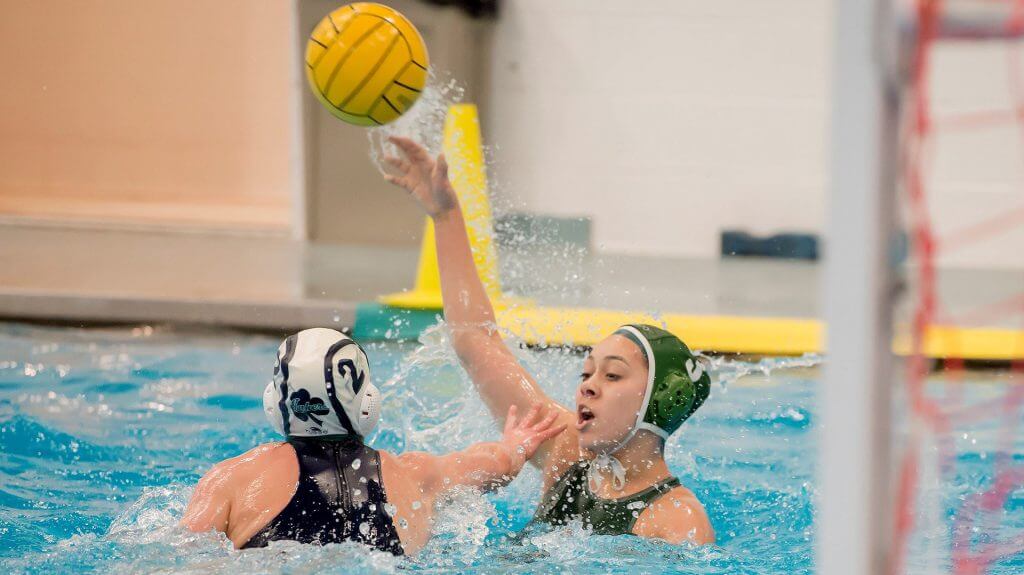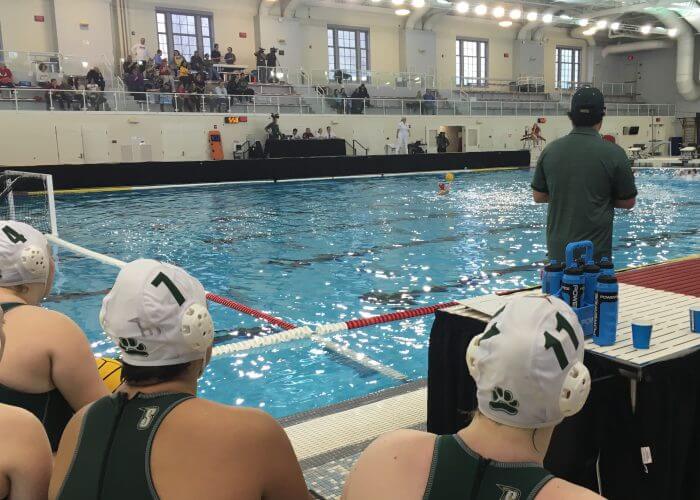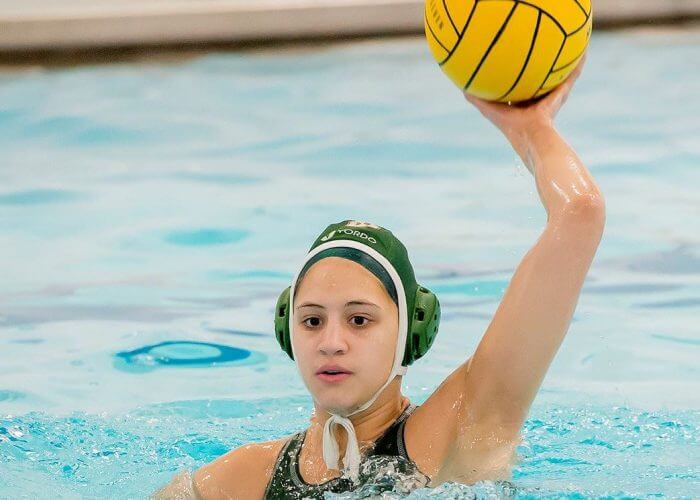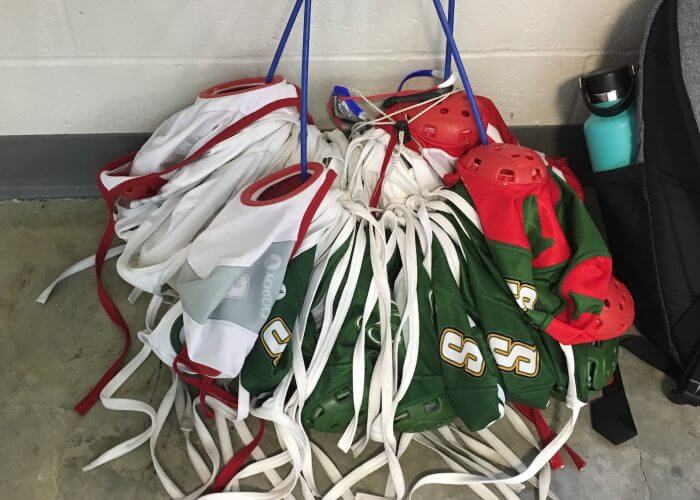On The Record with Alex Williams, Siena Women’s Water Polo New Head Coach

PROVIDENCE, RI. The Siena women’s water polo program has historically dwelled among the lower rungs of the Metro Atlantic Athletic Conference (MAAC). Picked seventh of the conference’s nine schools in the 2020 coaches preseason poll—just ahead of a rebuilding St. Francis Brooklyn and newcomer (to polo) Long Island University—in almost two decades of competition the Saints have qualified for the postseason twice, in 2008 and 2010. Since the program was launched in 2002, the Saints have never have enjoyed a winning season. In 2007 Siena was 15-15—but 1-9 in MAAC play.
[2020 Swimming World Women’s Water Polo Previews: Metro Atlantic Athletic Conference]
 Three years ago, Tamara Perea was hired to change the polo culture in Loudonville, New York where the small, Catholic college is located. After two years and 44 losses—against 17 wins—the California native has returned home, taking a position on Natalie Benson’s coaching staff at Fresno State. Enter Alex Williams last October as the programs seventh head coach. A former club player at Arizona, the San Diego native has spent time as head boys and girls coach at Torrey Pines High School as well as working with the San Diego Shores program, the highly regarded club program run by Doug Peabody.
Three years ago, Tamara Perea was hired to change the polo culture in Loudonville, New York where the small, Catholic college is located. After two years and 44 losses—against 17 wins—the California native has returned home, taking a position on Natalie Benson’s coaching staff at Fresno State. Enter Alex Williams last October as the programs seventh head coach. A former club player at Arizona, the San Diego native has spent time as head boys and girls coach at Torrey Pines High School as well as working with the San Diego Shores program, the highly regarded club program run by Doug Peabody.
A shift to the East Coast in 2019 was a fortuitous move for Williams. He served a year as Brian Kelly’s top assistant for the Iona men’s and women’s programs, providing him a grounding in the peculiarities of Northeastern polo—including shallow deep pools, a dearth of qualified athletes and the perpetual absence of sunlight, a circumstance entirely unfamiliar to Californian polo players.
These experiences will serve Williams well as he takes over a program desperate for a new direction. In this year’s recruiting class Perea left her successor some valuable components. Among the six freshmen signed for 2020, two—Sydney Jones and Anna Mossakowski—are goalies. Paired with Diana Fernandez (64 goals, 32 assists, 34 steals, first-ever All-American at Siena) and Sophia Torres (31 goals, 29 assists), two outstanding upper classmen, the new Siena coach has considerably more talent to work with than his predecessor.
Swimming World caught up with Williams on the pool deck of Brown’s Kathryn Graham Aquatics Center after his team had captured their first win of the season—and the rookie coach’s very first leading an NCAA varsity program.
– Your thoughts on your first-ever NCAA varsity win—17-15 over Austin College.
One thing that I haven’t had to harp on is coming out and playing hard. Our biggest challenge right now is chemistry and cohesion. So second game into the season, there’s a lot of sloppy plays, some poor choices and decision making with the ball.

Siena’s Alex Williams gazes over the expanse of Graham pool. Photo Courtesy: M. Randazzo
Over time, we feel confident that, along with athleticism, our chemistry will sort itself out. Just looking at today’s game, we obviously don’t want to dig ourselves in too deep of a hole early on.
Our players need to continue to honor the process. They need to be students of the game, keep studying, make some better decisions and play a cleaner brand of water polo. That said, it was a big positive that at halftime we could regroup. We looked like a different team in the second half than from the first.
– What do you attribute that to?
We talked about pride. There were too many things that could be drawn up, but a lot of it could be fixed by having some pride. Have pride in your defense, make better decisions on defense. Have pride on offense, you won’t turn the ball over as much.
I thought our juniors, especially our junior attacker, Anna Borton, did a good job of setting an example, taking some of the pressure [off her teammates] and putting it on herself. Half our team is freshmen, so we have a lot of people who are looking around for experience. The fact that we have upperclassmen who can step up when the going gets tough says a lot about them.
– You have two experienced and skillful upperclassmen in Diana Fernandez and Sophia Torres.
If we constantly have to depend on Diana or Sophia or [junior] Kristen Burger, then that’s not good for us. Eventually, we want our freshmen to be able to step up—and our sophomores too,—to say: “I’m willing to step in the spotlight as well. I’m willing to take the ball in pressure situations and handle that.”
– I saw this team a year ago at Wagner and it did not appear to be mentally prepared to compete. Now it’s a totally different team. What changed—besides you as coach?
We talk about our approach to success, and it has nothing to do with our win-loss record or the final score. We’re focused on good habits every single day, every single moment, be it practice or a game, a half or a quarter. It’s one possession or one play. Execute that play to the best of your ability.

Sophia Torres. Photo Courtesy: Siena Athletics
We’re successful if we live up to the standards of our program. Everybody knows that, despite whatever the score may be, they are expected to live up to the standards with their behavior and the way they compete.
I have no issues with that right now. Everybody understands that and they compete hard. But it’s [also] chemistry. We feel good that in the long run, with this approach, that fewer turnovers, more goals scored, a more efficient, clean game will be a byproduct of how we approach success.
– Another challenge has been the goalie position— but you have two freshmen, thanks Perea’s recruiting.
I can only say that I’m lucky. There’s a lot of coaches that go into a new program and it’s a big challenge to try to set a culture or a tone, especially with players they didn’t recruit. The players when I speak, their eyes are up and they listen. When we talk about an adjustment we want to make in a game, they listen. And the upperclassmen, they reinforce [that]. They say it too.
A big reason why I came here is because especially the upper classmen have a really strong desire to be successful and win. And the freshmen are like that too. It’s part of their DNA, part that these players have had good coaching and their club and high school coaches have done a fantastic job.
And I’m the beneficiary of that.
And as far as the goalies go, they’re both freshmen. It’s a bit unusual to have all your goalies be in the same class, but we believe that competition brings out the best in both of them. So in practice, they work extremely well with each other—and make each other better.
In my mind, they have different strengths and weaknesses, but they have done everything they can to earn their playing time.
– Given your time with Iona, you’re experienced with Northeastern water polo, including the region’s high percentage of shallow-deep pools.
We have a saying in our program. It’s called: “The obstacle is the way.” We just don’t complain about it because it’s not going to do us any good.

Photo Courtesy: M. Randazzo
I mean, we find ways to turn it into an advantage. So, when people come play at our pool, we want to make sure we’re masters of our environment.
There’s been adjustment for me in terms of learning how smaller pool works in plays. But at the end of the day, there are tried and true fundamental ways to play good water polo—in a big or a smaller pool. Right now we’re trying to instill those habits and the subtle nuances of the different core skills. We’ll get there but we’re not going to skip steps right now. We want to make sure everyone has basic body balance, everyone passes and shoots downhill. That needs to happen regardless of any pool.
That’s what we’re focused on right now, especially since our tournaments early in the season are all in deep pools. As we get closer to MAAC play, we’ll do more training tactics for a shallow, deep environment.
– I know it’s always a game at a time, day at a time. But the goal is to get to your conference playoffs. How do you see your team progressing this season?
We really don’t talk about it, to be honest—maybe once or twice, just to give them a north star to aim for. But like I said, our approach is to be present in the moment. We can’t win or get into a top four position by wishing it into existence. We have to learn to play good water polo and have basic skills in place.
If it happens, that’s great, but it’s because we’ve mastered our habits and we play well as a team. I mean, everybody wants to win, but who wants to do the work to do it? We’re doing the work right now.



